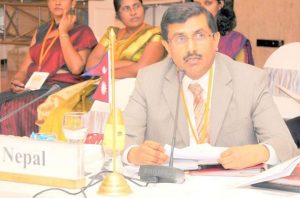With the increasing number of social media users in Nepal, the cybercrime rates have also escalated. Kathmandu Police had filed 81 cases of cybercrime from (Facebook, Twitter, and Viber) at the Kathmandu District Court in the last fiscal year. This fiscal until the month of February itself some 82 cases of cybercrime have been registered. (Purushottam P. Khatri, 2019)
The increased victimization due to the proliferated number of cybercrime issues now raises a question on whether the use of such channels should be regretted in the first place. When we talked to Mr. Birendra Mishra, the Joint Secretary of Ministry of Communication and Technology, he stated, “We need to look at the positive side of the scenario. If there are 99% positive repercussions of using social media, there is only 1% negative effect of using it. Our objective should be to minimize this 1% harm as well, so that harmonious use of social media can take place in the country.”
Let’s look at the changing landscape of the use of social media in the context of Nepal:
- Social Media has become an important tool for communication:
Until April 2018, there were around 9,500, 000 Facebook users in the country and this excludes the many Nepalese users who have migrated to other countries now use Facebook as an important channel of communication (Badu, 2018). Not only Facebook, but other social media sites like Messenger, Viber and WhatsApp have become an important tool of communication which has resulted in lower telecommunication expenses with faster connectivity for people. The use of social media has definitely helped people stay connected to their family and friends even when they share a large geographical distance and this is something we cannot leave untouched.
- The existence of the Digital Divide in the country:
While the access to the internet is increasing rapidly in the country, we cannot overlook the fact that majority of this internet access tends to be crowded in the urban cities themselves while the rural population still lacks access to proper internet connection.
According to Mr. Chandan Thakur, Facebook Developers Circle Lead for Kathmandu, “It is important that the rural population’s access to the Internet increases too. The government should encourage and initiate businesses to move outside of the urban cities of the country as when businesses will find their way to the rural area, they will also automatically find a way for connectivity in those rural areas.”
Furthermore, Mr. Mishra from Ministry of Communication and Information Technology stated, “By the end of the fiscal year, we have set the objective of having 4G internet connection in all the parts of Nepal which shall automatically ensure that majority of the population of the country has an access to not only internet but fast-speed internet.”

He further elaborated stating, “When it comes to the use of the Internet, knowledge leaks work the best. Keeping this in mind, through coordinated efforts of the Ministry of Education and Ministry of Communication and Information Technology, we will be hosting digital educational programs in a minimum of 1000 community and government schools. Alongside, we will also conduct digital literacy programs for the awareness of local community people. Through such efforts, we aim to empower at least one member from each family towards digital education such that these empowered members can extend further knowledge and information with their family members.”
- Social Media Marketing Taking a Huge Rise:
In the case of Nepalese startups and corporate organizations, the tendency of using social media marketing has seen a huge surge. Today, Nepal has become a good market with a lucrative source of revenue for companies like Facebook and Instagram who use the advertisement based revenue model.
As stated by Mr. Mishra, “When social media sites like Facebook and Instagram generate a large amount of money from Nepal through advertisement models, it is important that the registration of such social media sites must be made mandatory otherwise the country would lose out on a lot of revenue in the form of taxes that such social media companies would have to pay. In order to bring such social media companies that operate and generate money from the Nepalese market, it is crucial that their registration is made mandatory.”
- The thin-line between substantial and fake information fading out:

Social media undoubtedly has been bridging the information gap and has become a source of news for many. According to a research done by Massachusetts Institute of Technology (MIT), fake news travels faster than true news when it comes to social media. The research further brought out facts like false news was 70% more likely to spread on the internet, whereas it took six times for true news to reach only 1500 people.
This data is not a good indicator and we ourselves remember the time when social media was flooded by false information of Dr. Upendra Devkota’s death in December 2017.
According to Mr. Thakur, “It is of immense importance that people truly check their source of information and have enough information about an issue before they post anything on social media. Only if people showed the consideration to actually check the reliability of information before clicking the share button, a lot of misinterpreted information could be saved from going out.”
The Way-Out:
There are pros and cons to everything. When it comes to social media as well, there are chances that people could either change their course of life towards the positive through the power of social media or they could become the victims of misuse of social media. It entirely depends upon people how they want to use social media. A little bit of care and consideration while using the medium would be of the best benefit for all the stakeholders.







